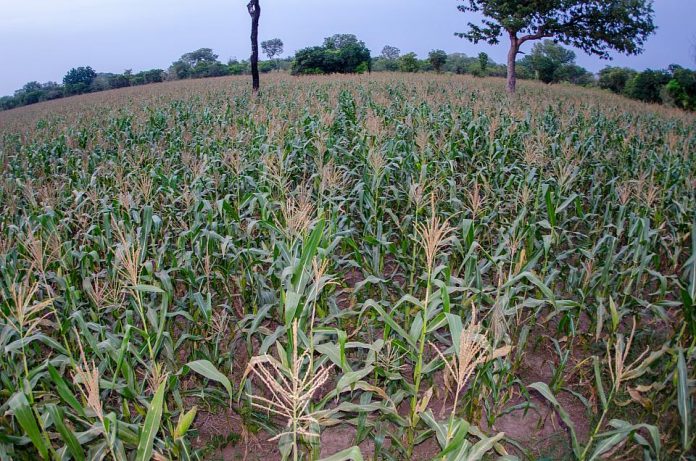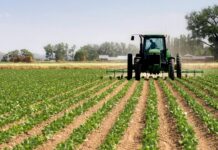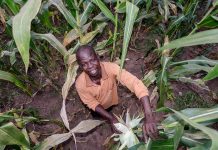
Akosua Elizabeth is the leader of the women farmers in Asankasu in Eastern Ghana. In the new farming season, she and farmers in her region are certain of a good harvest and a surplus. In particular, Elizabeth is looking forward to replacing her thatched roof with a modern one with the proceeds of her farming activities.
The women in Asankasu are beneficiaries of the Ghana government’s Planting for Food and Jobs (PFJ) Program that aligns with the US$ 280 million Partnership for Inclusive Agricultural Transformation in Africa (PIATA) – an initiative of AGRA, the Rockefeller Foundation, the Bill & Melinda Gates Foundation, and USAID to catalyze and sustain changes to agricultural systems. The partnership, a first on this scale, seeks to increase incomes and improve food security for thirty million smallholder farm households in eleven countries by 2021.
“This will be a massive and unprecedented infusion of public resources into Agriculture never seen before in Ghana or anywhere else in Africa,” says Ghana’s minister for Food and Agriculture Dr Owusu Afriyie Akoto. He also has a message for African governments: “Let agriculture lead your fight against poverty,” he adds. “Your priority should be one, agriculture, number two, agriculture and number three agriculture!”
The initiative seeks to make Agriculture more profitable especially for women and the youth, improve the lives of existing farmers, while increasing food security.
Ghana’s PFJ Program includes a 50 percent subsidy on farming inputs. “This is the first time in the history of Ghana that we have such a facility,” says the Director of Crop Services at the Ministry of Food and Agriculture, Seth Osei Akoto. Farmers registered biometrically with the ministry to receive a coupon which gives them access to improved seeds and fertilizers.
For farmers like Elizabeth in Asankasu, armed with knowledge and farming inputs, the impact is nothing short of revolutionary at the personal level. “Everybody is enlightened,” she adds, “we see a lot of change and we feel liberated.” Elizabeth cites the freedom of choice in her purchases that comes from having more money in her pocket.
Now in its second year of implementation in Ghana, the impact of PFJ Program is spreading across the country. “In 2017 we did not import maize into this country,” says the minister. A total crop value of GH¢1.2 billion (US$ 270,276,000) was realized as a result of improved seeds and fertilisers combined with increased extension service delivery in the production of an additional 485,000 MT of maize; 179,000 MT of rice; and 45,200 MT of vegetables. Additionally, a total of 745,000 jobs, mainly in the rural economy, were created in 2017.
Farmer recruitment targets have also been exceeded. With two hundred thousand farmers targeted in the first year of implementation, this increased to six hundred thousand farmers in 2018. The target for 2019 is a million farmers and 1.5 million by 2020 out of a total of approximately five million farmers in Ghana.
These developments are in line with AGRA’s and the PIATA partners’ efforts to leverage their networks for greater impact in transforming African agriculture. This includes a deployment of technologies, shared knowledge and grant support to fully unlock the potential of Africa’s smallholder farming and agribusiness enterprises to drive job creation and inclusive economic growth.
The partnership has enabled the Ghana government to mobilize resources for the PFJ Program, as well as giving it the platform to articulate the policy vision at the Africa Green Revolution Forums 2017, Cote d’Ivoire and 2018, Rwanda respectively.
Extension service is a key plank in the PJF, which AGRA is supporting by improving the extension curricula in Ghana. AGRA is also intervening in seed production, which had been earlier identified as one of the major challenges faced by the PFJ Program.
The Smallholder Inclusivity and Productivity for Market Access (SIPMA) Project is a three-year project to unlock the maize and soya bean value chains. Among AGRA’s private sector partners in SIPMA is Ecobank and the Youth in Agriculture initiative under the PJF to secure credit on inputs for smallholder farmers. Farmers also receive training on best agronomic practice and facilitation to ready markets.
The future looks bright for Ghana.
Source: Ghana/Starrfmonline.com/103.5FM




